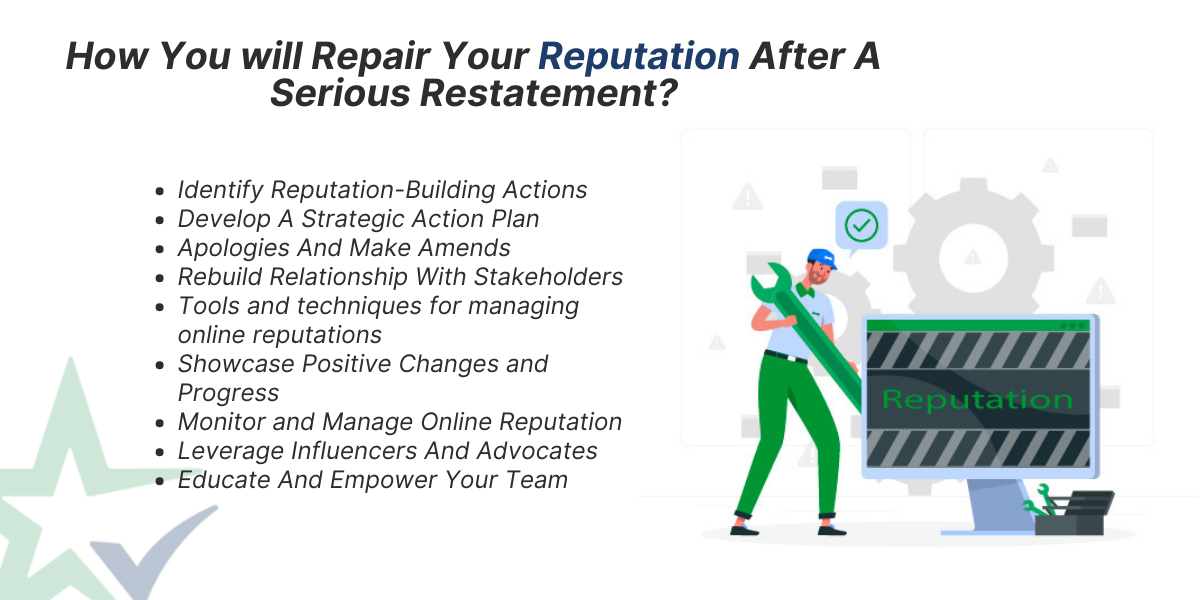Any organization’s reputation is a valuable asset, but what happens when that reputation is tarnished by a serious accounting restatement? How to repair your reputation after a serious restatement? In this blog post, we look at how businesses repair their reputations after such events. Here we shed light on the strategies used by companies to regain stakeholder trust through a thorough examination of press releases and reputation-building actions. Join us as we learn about the key findings and effective reputation repair techniques.
Table of Contents
What Is The Impact Of A Serious Restatement?
Accounting restatement or serious restatement has an impact on a company’s reputation that goes beyond financial statements. Immediate and effective action is critical for mitigating damage and rebuilding trust. Stakeholders are concerned about restatements, which destroy trust in financial reporting. Addressing the aftermath as soon as possible reduces the negative impact on reputation. Long-term success is dependent on reputation, which influences customer loyalty and investor confidence. Transparent communication and corrective actions help to rebuild trust. A proactive approach to reputation management is required.
How You’ll Repair Your Reputation After A Serious Restatement?
Reputation-building actions require a thorough analysis of an organization’s public communications, such as press releases, social media presence, and website content. Here’s how you can repair your reputation after a serious restatement:
Identify Reputation-Building Actions
You can identify a reputation-building action by getting Feedback from stakeholders like clients, employees, and investors can help you understand how your actions have improved their perceptions. Comparing yourself to others in your industry can help you find special tactics that boost your reputation.
Additional guidance comes from keeping an eye on media coverage and consulting experts. Measuring the effect of particular actions on reputation is made easier by using reputation monitoring and repair metrics with analytics tools along with keeping track of customer reviews and feedback. Organizations can learn insights to guide future reputation-building strategies and uphold stakeholder trust by adopting these methods.
Develop A Strategic Action Plan
Rebuilding your reputation after a serious restatement requires a well-thought-out strategy and a serious action plan. Below I mention the steps for repairing your reputation.
- Analyze the circumstance and establish the degree of reputational harm.
- Clearly define your goals and make sure they are time-bound, relevant, measurable, and specific.
- Determine the most effective tactics for regaining reputation and trust.
- Set deadlines, assign responsibilities, and outline actionable steps.
- Allocate the resources you’ll need, such as money, people, and outside assistance.
- Establish measurable KPIs to gauge success and track progress.
- Establish a reasonable timetable for carrying out the action plan.
- Monitor, assess, and modify strategies as necessary on a regular basis.
- Encourage accountability and internal communication within the team.
- Rebuild trust by using open external communication.
Apologies And Make Amends
After a serious restatement, there are specific steps you should take to apologize and make amends. Create a sincere apology that expresses regret for the error and accepts full responsibility without offering any justifications. Be specific about the actions or choices that led to the restatement to show that you have a firm grasp of the problem. It is critical to speak in a sympathetic manner that recognizes how the restatement will affect those who are impacted by it.
Rebuild Relationship With Stakeholders
Rebuilding stakeholder relationships after a serious restatement involves open dialogue, transparent communication, and accountability. By actively listening to concerns, delivering on commitments, and reestablishing personal connections, you can address issues promptly and foster positive resolutions.
Tools and techniques for managing online reputations
Leverage online reputation management tools by monitoring your online presence, promptly responding to feedback, generating positive content, optimizing search engine results, managing social media, encouraging positive reviews, and addressing false information. Actively managing your online reputation will help mitigate the impact of negativity and promote a positive brand image.
You may also Read: Hyperlocal Social Media Marketing for Local Audience
Showcase Positive Changes and Progress
After a serious restatement, it is important to highlight improvements that have been made, highlight success stories, encourage transparency, highlight customer satisfaction, and commemorate milestones. These actions show that you are dedicated to making things right, earning people’s trust, and re-establishing your good name.
Monitor and Manage Online Reputation
To monitor and manage your online reputation you can use Google alerts to timely give notifications about mentions. You should stay active on social media platforms, and respond to reviews and feedback while encouraging positive reviews. You should monitor search engine results and address false information promptly. By doing this, you can actively monitor and manage your online image.
Leverage Influencers And Advocates
To repair one’s reputation, one should work with influential people, cultivate brand ambassadors, encourage word-of-mouth advertising, engage in targeted influencer campaigns, look for industry partnerships, and keep strong relationships through engagement and monitoring. Utilizing their authority and influence can greatly improve your reputation and foster new levels of trust.
Educate And Empower Your Team
You should educate your team for showing professionalism in their work so that you can deal with your work efficiently and effectively. As an organization owner or team lead you should foster accountability and responsibility within your employees. Also, empower your team for doing great work so that when they perform work next, they do it with happy minds.
Final thoughts
A well-executed plan and a dedication to mending trust are necessary for recovery from a serious restatement. You can take proactive measures to restore your reputation and lay a strong foundation for future success by adhering to the steps described in this guide. Remember that reputation repair requires time and effort, but with patience and the appropriate strategy, you can win back stakeholders’ trust and reestablish your credibility.



